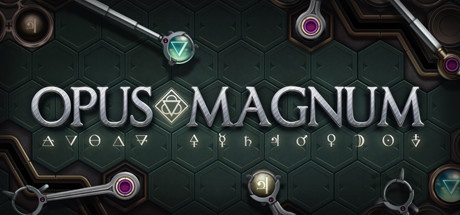
About Opus Magnum:
In this imaginative experience, the player steps into the role of a skilled alchemist who must craft intricate creations by rearranging atoms drawn from fundamental alchemical materials, including both classical elements and the ancient metals revered in early science. Using a sophisticated transmutation mechanism displayed as a hexagonal grid, the player strategically organizes numerous devices and interactive zones to design efficient solutions. Within this elaborate structure, mechanical manipulators serve as the core instruments, functioning as articulated arms that pivot, grasp, release, and rotate atomic components with precision. Some versions of these mechanisms can elongate, retract, or move fluidly across designated tracks, allowing for greater flexibility in shaping the alchemical process. Each movement demands thoughtful planning and synchronization, encouraging a balance of logic and creativity as the player refines every motion to achieve perfect transmutation.
Within the intricate structure of this alchemical system, the transmutation zones perform several vital functions, such as forming or breaking atomic bonds, converting essential materials into salt, or refining base metals into superior forms through the use of quicksilver. Every component responsible for manipulation carries an associated cost, reflecting the complexity and efficiency of the design. However, the player is granted complete creative freedom, unrestricted by limitations on the number of mechanical tools, the overall expense, or the physical space occupied by the constructed mechanism. This open approach allows for endless experimentation and encourages both precision and innovation, letting the player design complex transformations that balance artistry and function while achieving the most elegant and effective solutions possible.
System Requirements:
- RAM: 4GB
- Processor: INTEL Core i-3
- Operating System: Windows 10, 7, 11 and 8.1
- Storage: 2GB
This experience presents a complex puzzle-driven system where the player assumes the role of an inventive alchemist, tasked with constructing and programming a variety of intricate machines to perform specialized alchemical operations. Initially launched for multiple platforms including Windows, Linux, and Mac after a brief early access period, it challenges the player to design functional solutions using a range of mechanical components and tools, allowing complete freedom as long as the desired outcome is achieved. Beyond simply completing tasks, players are encouraged to optimize their creations, aiming to minimize construction costs, reduce the time required for operation, or limit the overall space their mechanisms occupy, with competitive rankings highlighting the most efficient designs. Its foundations trace back to an earlier experimental project, reflecting the creative legacy of its developer and building upon principles first explored in prior alchemy-themed engineering games. The combination of strategic planning, programming logic, and creative problem solving results in a deeply rewarding and intellectually engaging experience that constantly tests both ingenuity and precision. You can also download Elementium game for PC highly compressed from here.
Screenshots of Opus Magnum:
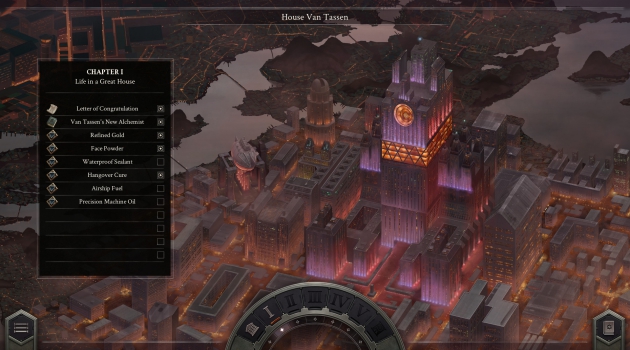
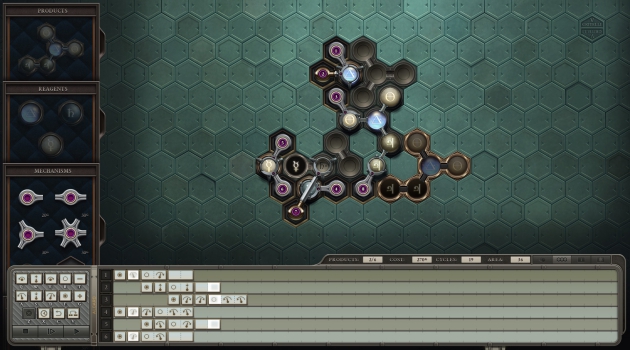
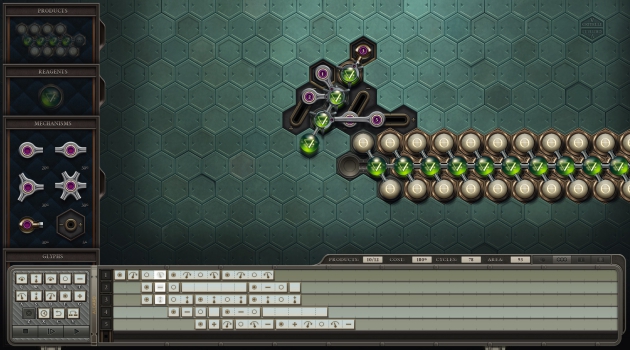
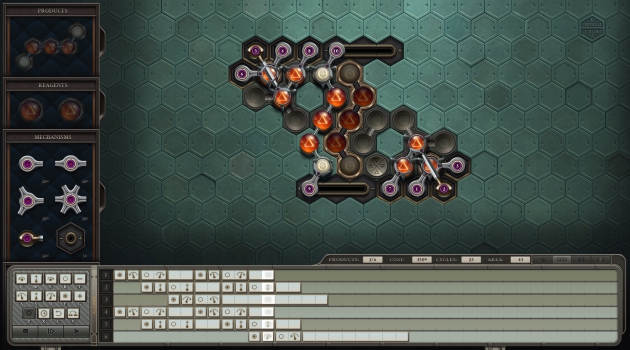
More About Opus MagnumHighly Compressed 300MB:
Once the mechanical manipulators are positioned within the alchemical framework, the player must assign a specific sequence of instructions to each arm, guiding atoms from the designated input zones to the correct output locations to form the desired compounds, with early challenges illustrating transformations such as converting lead into gold. Each manipulator operates independently, yet all execute their programmed commands simultaneously once the system is activated, creating a complex choreography of motion that requires careful planning and timing. Most challenges are structured around producing a predetermined quantity of finished products, requiring the machine to function reliably across multiple cycles without error. If the constructed apparatus encounters an impossible scenario, such as atoms colliding with one another, an atom colliding with a manipulator base, or two manipulators attempting to move the same atom in conflicting directions, the system halts immediately, prompting the player to analyze the failure and adjust the arrangement. This iterative process encourages precision, strategic foresight, and continual refinement, turning each puzzle into a dynamic test of both engineering skill and creative problem solving.
After the player successfully constructs a machine that fulfills all the requirements of a given challenge, their solution is evaluated and compared with others based on three key criteria, including the operational speed of the mechanism, the overall resource cost required for its construction, and the physical footprint it occupies within the workspace. Players are encouraged to experiment with alternative designs, refining and optimizing their devices to achieve faster performance, lower material usage, or a more compact layout, allowing for continual improvement and creative problem solving. Once a solution reaches completion, it can be exported as an animated GIF, providing a visually engaging way to share the intricate movements and elegant engineering of the machine with others on social media, highlighting both the technical achievement and the aesthetic appeal of the alchemical process. This system creates a dynamic environment where innovation, efficiency, and presentation all play a significant role in the overall Gameplay.
The creation is organized into a series of chapters, each offering a collection of carefully designed challenges that players can approach at their own pace, returning to puzzles as needed to refine strategies or explore alternative solutions. Progression through the chapters requires the completion of all puzzles within the current section, ensuring a structured advancement that gradually increases in complexity and encourages the development of both skill and creativity. In addition, the system includes support for user-created content through a workshop platform, allowing players to design and share their own challenges with the community. To maintain a consistent standard, only puzzles that the creator has successfully completed themselves are accepted, guaranteeing that every submitted challenge is achievable. This combination of structured progression and user-generated content fosters a dynamic environment where experimentation, problem solving, and imaginative thinking are constantly rewarded, while providing endless opportunities for both personal growth and community engagement within the alchemical world.

